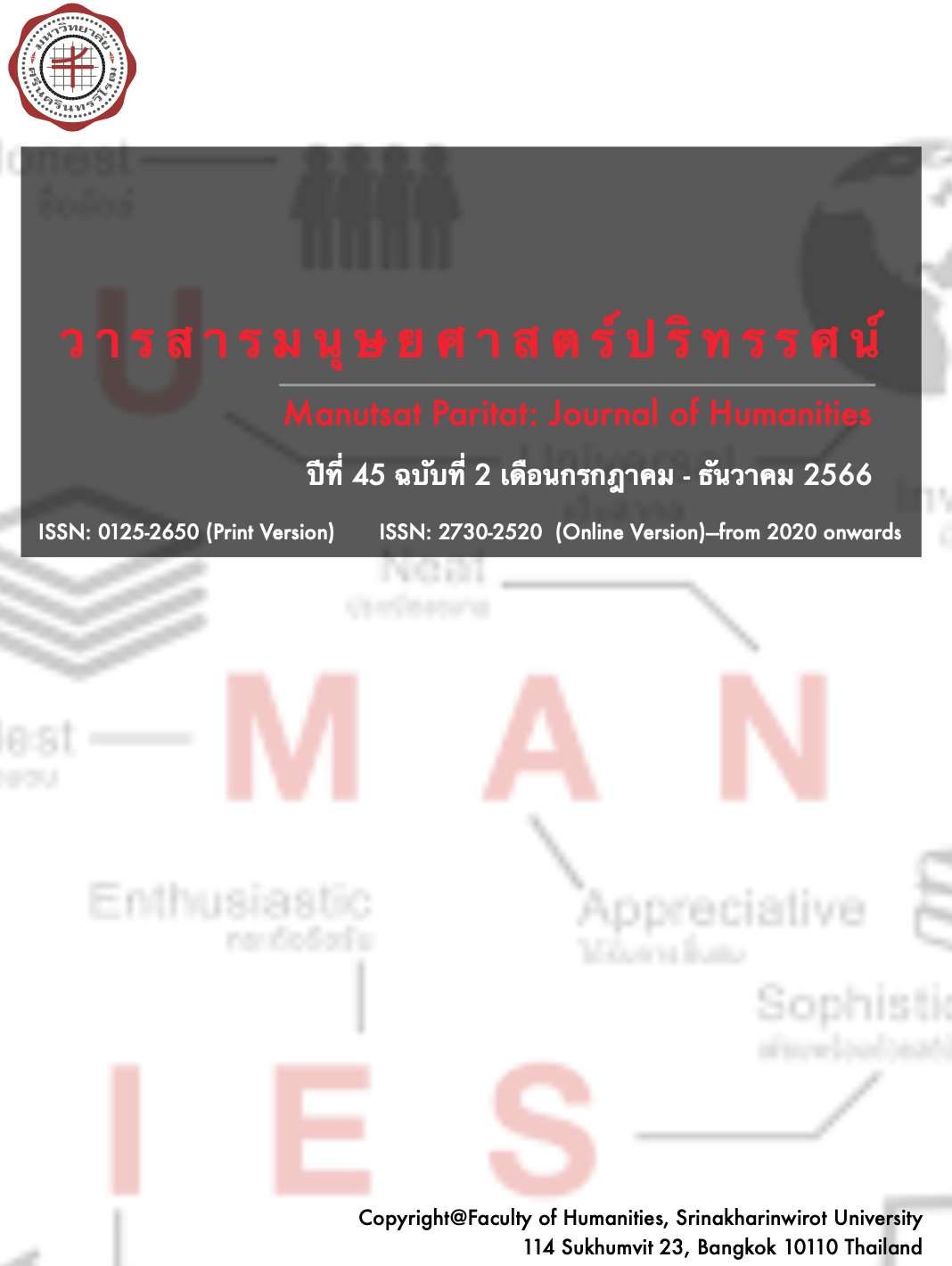A Comparative Study of User-Generated Written Compliments in English: Analyzing a Compliment Object ‘Tom Yum Goong’ with Two Semantic References
Main Article Content
Abstract
Numerous studies investigated spoken compliments on characteristics of an entity or a person based on Holmes’ (1988) definition (Charoenroop, 2021; Ebadi & Pourzandi, 2015; Lin, 2020; Lin et al., 2012, Yuan, 2002). A handful of studies, however, explored written compliments on characteristics. With the rise of Web 2.0 technology, user-generated content (UGC) has become an increasingly popular form of content among users of various backgrounds to encode their messages using English to bridge intercultural interaction. This study compared user-generated compliments for the characteristics of ‘Tom Yum Goong’ (TYG)—a compliment object with at least two semantic references: (i) ‘food’ and (ii) a ‘movie’. The data were collected from 100 non-Thai users who made compliments in English on Twitter, Facebook, YouTube, and some personal blogs between 2015 and 2021. There were 114 compliments for TYG as food, 108 compliments for TYG as a movie. Results showed that strategies for spoken compliments are present in written compliments. Regardless of the semantic references, the use of positive adjectives and evaluation occurred the most frequently with a wide range of syntactic units. Most of the user-generated compliments were short and straightforward. The explicitness allows readers of various backgrounds to quickly identify the UGCs as compliments.
Article Details

This work is licensed under a Creative Commons Attribution-NonCommercial-NoDerivatives 4.0 International License.
Any unauthorized copying, publication, reproduction or distribution of copyrighted works appeared in Manutsat Paritat: Journal of Humanities is an infringement of the copyright owners’ rights. To authorize the copying, publication, reproduction or distribution of copyrighted works to be appeared in other printed materials or any online media, please write to MPJHthaijo@gmail.com for permission.
References
Brock, B. (2014, February 25). Watch: Tony Jaa is back in action in trailer for ‘the protector 2’. The Playlist. https://theplaylist.net/watch-tony-jaa-is-back-in-action-in-trailer-for-the-protector-2-20140225/
Cenni, I., & Goethals, P. (2021). Business responses to positive reviews online: Face-work on TripAdvisor. Journal of Pragmatics, 180, 38−50. https://doi.org/10.1016/j.pragma.2021.04.008
Cenni, I., & Goethals, P. (2020). Positive reviews on TripAdvisor: A cross-linguistic study of contemporary digital tourism discourse. Onomázein, (Special issue 7), 18−40.
Charoenroop, P. (2021). “I’m Going to Remember this Audition for a Long, Long Time!”: Simon Cowell’s Compliments on spectacular performances on America’s Got Talent and Britain’s Got Talent. LEARN Journal: Language Education and Acquisition Research Network, 14(2), 88−114.
Duangsaeng, W., & Chanyoo, N. (2017). Intelligibility of Thai English restaurant menus as perceived by Thai and Non-Thai Speakers. Journal of Language Teaching and Research, 8(1), 1081−1089.
Ebadi, S., & Pourzandi, M. (2015). The effects of explicit and implicit pragmatic instruction on the development of compliments and Compliment responses. Journal on English Language Teaching, 5(4), 13−26.
Erker, E. K. (2012, November 11). Striking impressions: Exhibition explores Tony Jaa’s softer side. Bangkok Post. https://www.bangkokpost.com/life/arts-and-entertainment/320633/striking-impressions-exhibition-explores-tony-jaa-s-softer-side
Holmes, J. (1988). Paying compliments: A sex-preferential politeness strategies. Journal of Pragmatics, 12(4), 445−465. https://doi.org/10.1016/0378-2166(88)90005-7
Jha, A. (2021, February 15). Content strategy for the effective use of user-generated content. Gather Content. https://gathercontent.com/blog/content-strategy-for-the-effective-use-of-user-generated-content
Kitsios, F., Mitsopoulou, E., Moustaka, E., & Kamariotou, M. (2022). User-generated content in social media: A twenty-year bibliometric analysis in hospitality. Information, 13(12). 1−19. https://doi.org/10.3390/info13120574
Lin, C. Y. (2020). Exploring judges’ compliments and criticisms on American, British and Taiwanese shows. Journal of Pragmatics, 160, 44−59. https://doi.org/10.1016/j.pragma.2020.02.008
Lin, C. Y., Woodefield, H., & Ren, W. (2012). Compliments in Taiwan and Mainland Chinese: The influence of region and compliment topic. Journal of Pragmatics, 44, 1486−1502. https://doi.org/10.1016/j.pragma.2012.06.012
McCall, M., & Lynn, A. (2008). The effects of restaurant menu item descriptions on perceptions of quality, price, and purchase intention. Journal of Foodservice Business Research, 11(4), 439−445.
Naeem, M., & Okafor, S., (2019). User-generated content and custumer brand engagement. In G. Bowen & W. Ozuem (Eds.), Leveraging computer-mediated marketing environments (pp. 193−220). IGI Global. https://doi.org/10.4018/978-1-5225-7344-9.ch009
Ngampramuan, W. (2016). English as a lingua franca in Thailand: A case study of English used on signs in tourist domains. University of Nottingham.
Rithdee, K. (2013, October 25). Dude, where’s my elephant? Bangkok Post. https://www.bangkokpost.com/life/arts-and-entertainment/376279/dude-where-my-elephant
Romanowski, P. (2009). English as a modern lingua franca against the background of linguistic mosaic of the European Union. ELT, 11(73), 31−34.
Srisongka, N., & Yanasugondha, V. (2019). Intelligibility of English in Thai street food menus perceived by East Asian tourists. LEARN Journal: Language Education and Acquisition Research Network, 12(2), 107−121.
Tan, W., & Rungrojsuwan, S. (2022). Influences of social media on spoken and written English. Journal of Humanities and Social Sciences University of Phayao, 10(2), 23−40.
Tannen, D. (1982). Oral and literate strategies in spoken and written narratives. Linguistic Society of America, 58(1), 1−21.
Thepbamrung, N. (2013, September 22). Spat with star adds extra spice to ‘Tom Yum Goong 2’. Bangkok Post. https://www.bangkokpost.com/life/arts-and-entertainment/370892/spat-with-star-adds-extra-spice-to-tom-yum-goong-2
Tourism Authority of Thailand. (2017, August 17). Thailand Live Gastronomy festival organises to boost culinary tourism in the Kingdom. Retrieved from TATNEWS: https://www.tatnews.org/thailand-live-gastronomy-festival-organises-boost-culinary-tourism-kingdom/
Yuan, Y. (2002). Compliments and compliment responses in Kunming Chinese. Pragmatics, 12(2), 183−226. https://doi.org/10.1075/prag.12.2.04yua
Yusof, S. Y. A. M., & Hoon, T. B. (2014). Compliments and compliment responses on Twitter among male and female celebrities. Pertanika Journal of Social Sciences and Humanities, 22(8), 75−96.


